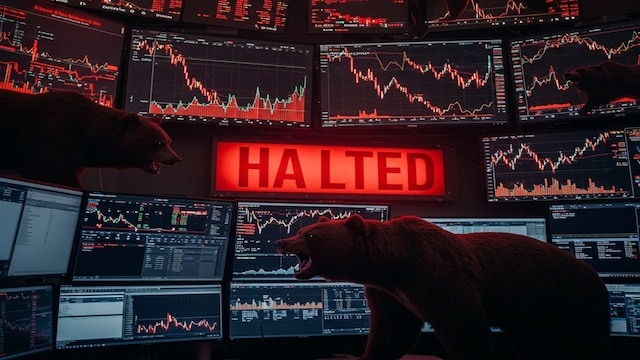
Indonesia's stock market fell by a massive 9% in early trade on Tuesday. Due to this, trading had to be halted for 30 minutes. On the other hand, the Indonesian rupiah weakened by 1.8% to its lowest level ever. This happened when the markets reopened after a long holiday and the impact of the turmoil in the global market due to US tariffs was visible. The main index of the market here fell by 9.2% in morning trade to its lowest level since June 2021.
After the lifting of the trading ban, the index improved a bit. The Rupiah also fell to 16,850 per dollar, which is the weakest level ever, crossing the low of the Asian Financial Crisis. News agency Reuters has given this information based on LSEG data.
Decline and rise expected
Quoting Bank Indonesia's Central Bank official Fitra Jusdiman, the central bank said that the central bank will continue to "strongly intervene" in the foreign exchange market, domestic NDF, bond market and offshore NDF market to stabilize the Rupiah. However, some analysts believe that the stock exchange may have changed the trading rules to stop the sell-off, but the decline may increase further.
Before the market opened on Tuesday, the stock exchange tightened the auto-rejection rules. Now if a stock falls by 15%, the sell orders will be automatically cancelled. Earlier this limit was between 20% and 35%.
The exchange changed the rule of stopping trading.
The exchange said that if the major index falls by 8%, then trading will be stopped for 30 minutes. Earlier this limit was 5%. If the decline reaches 15%, then there will be a break of 30 minutes. If the index falls by more than 20%, then trading will be stopped for the whole day. Earlier this limit was 15%. The exchange says that this will give investors a chance to understand the information and take a decision. What did the exchange say? IDX Chief Executive Iman Rachman said in a press conference, "We are taking this step in view of the market situation. We do not want to spread panic, but want to assure domestic and foreign investors that we are giving them a full opportunity to trade after more than a week's holiday." IDX executive Jeffrey Hendrick said that the rules can be changed again when the situation becomes normal. Reuters quoted Oktavianus Audi of securities firm Kiwoom Sekurita in this report that the new auto-rejection rules could provide some support to the index, but these changes are only short-term measures. He said, "The main reason for market concern is macroeconomic factors and Trump's tariff policy." He further said, "In our view, to reduce market pressure, the government will have to take strategic steps to maintain the stability of the rupiah, keep economic growth above 5% and maintain Indonesia's trade surplus." He believes that the index will remain under pressure on Tuesday. Indonesian markets opened for the first time since March 27 on Tuesday. They are catching the movement of the global market after the announcement of US tariffs last week. This also includes a plan of 32% tariff on Indonesian products. Jakarta has chosen the path of negotiations instead of responding to US tariffs. Officials said that a high-level delegation will go to Washington and present a proposal including a plan to buy more American products.
Read More: Third quarter GDP may increase, what is the reason? Learn everything from the report.
--Advertisement--

 Share
Share



